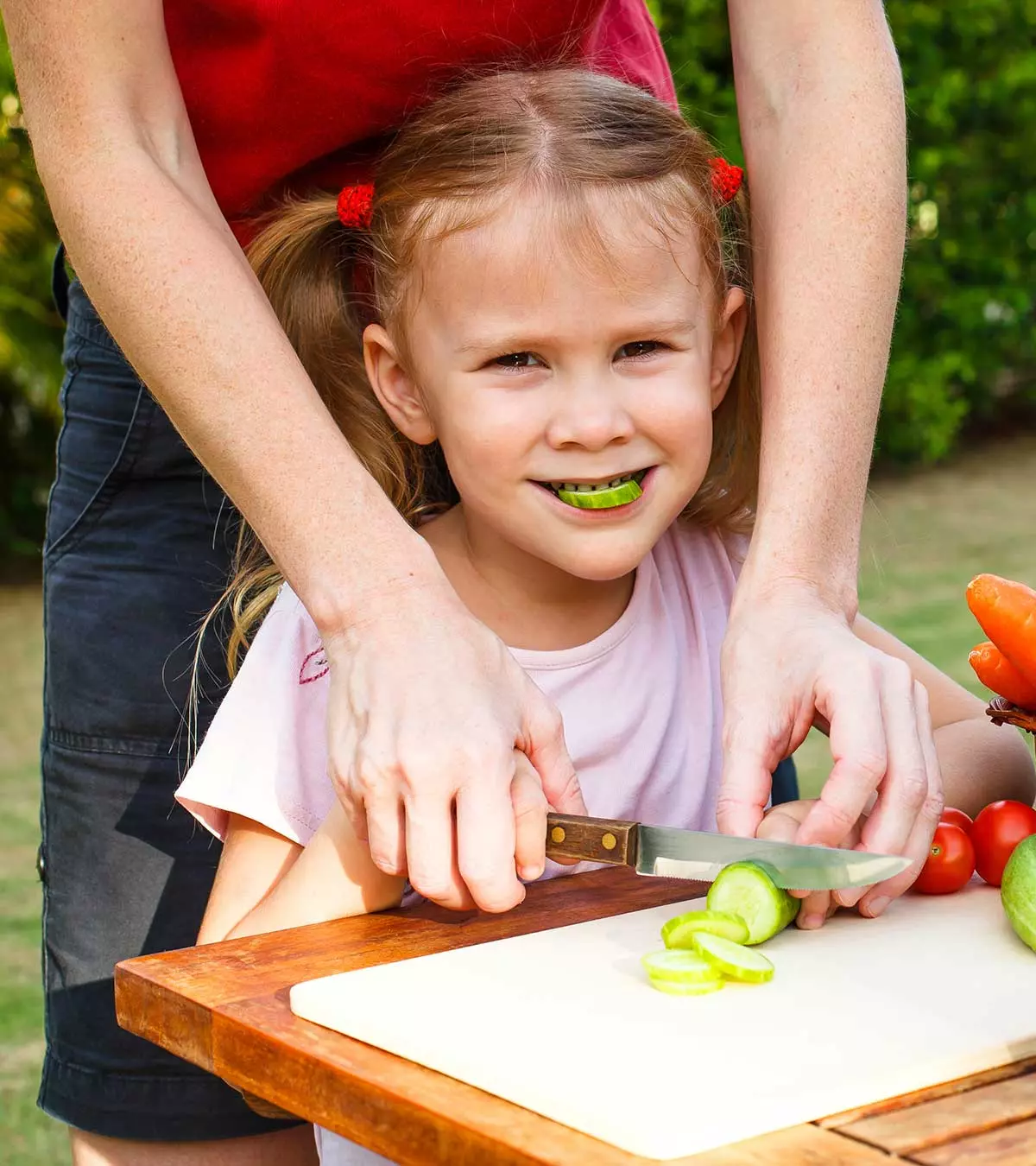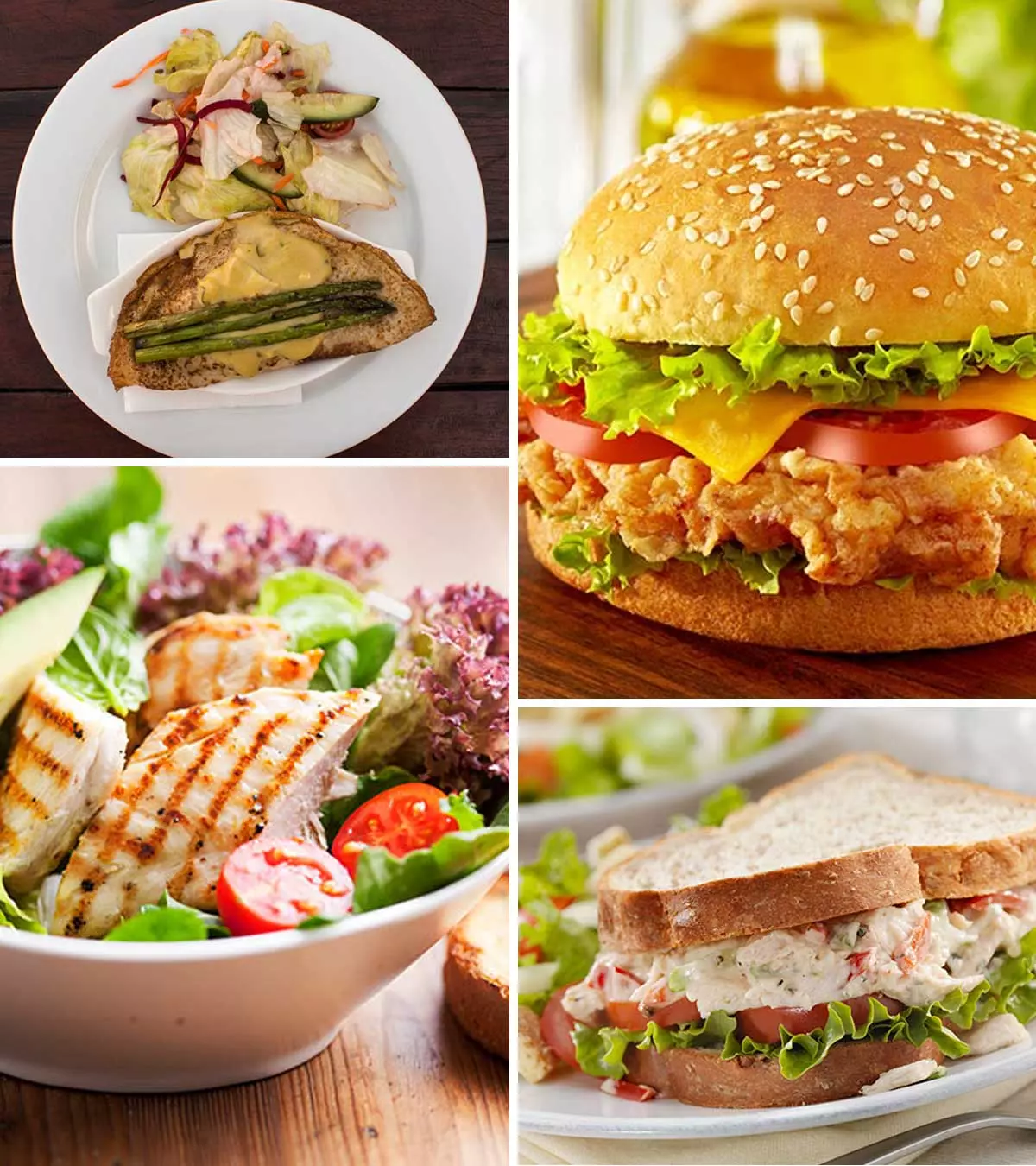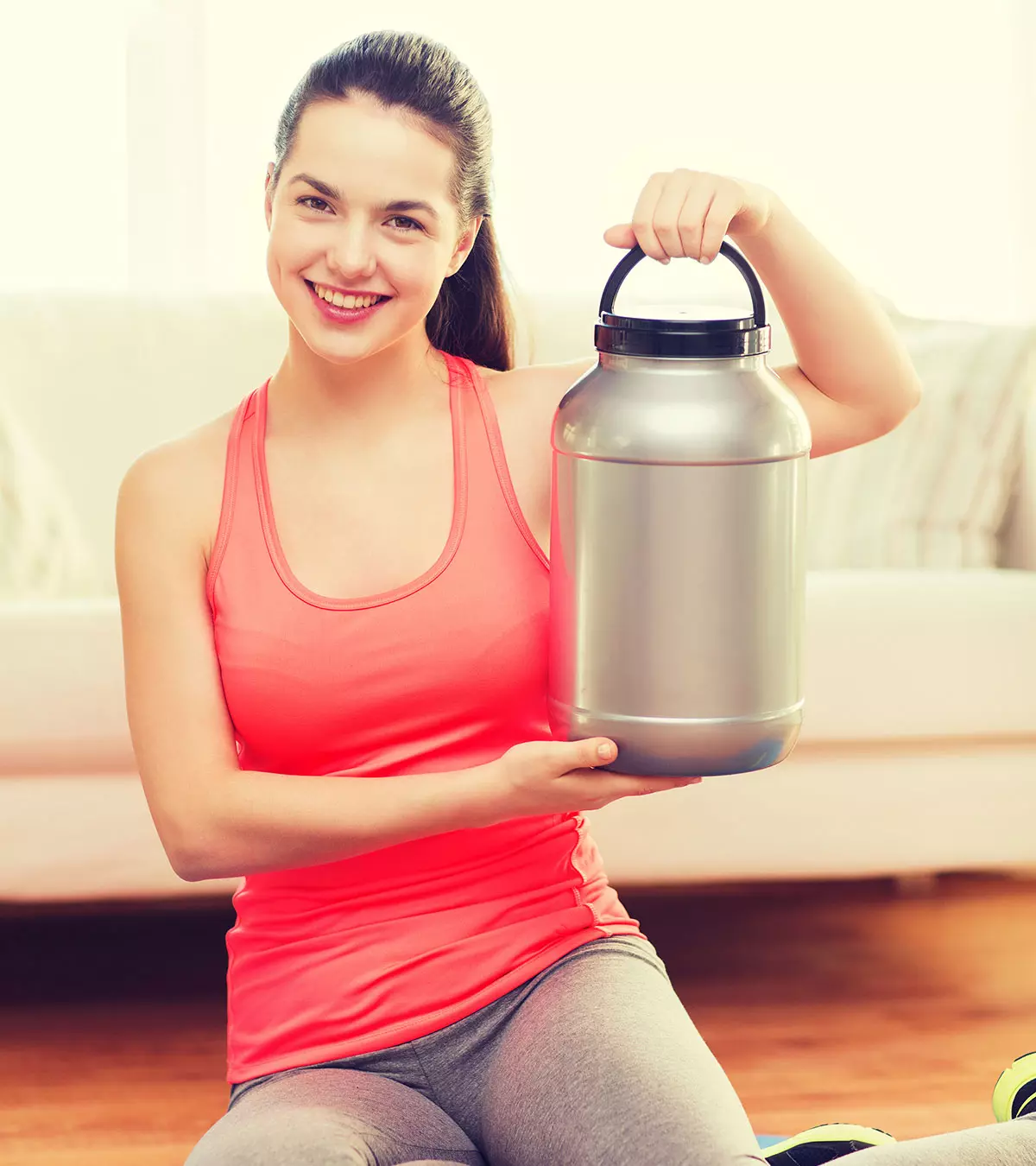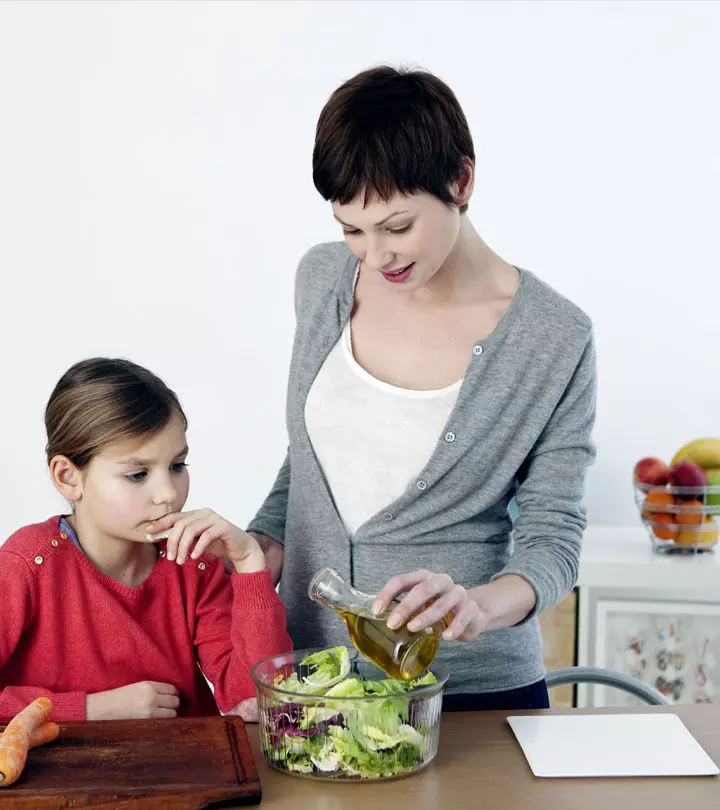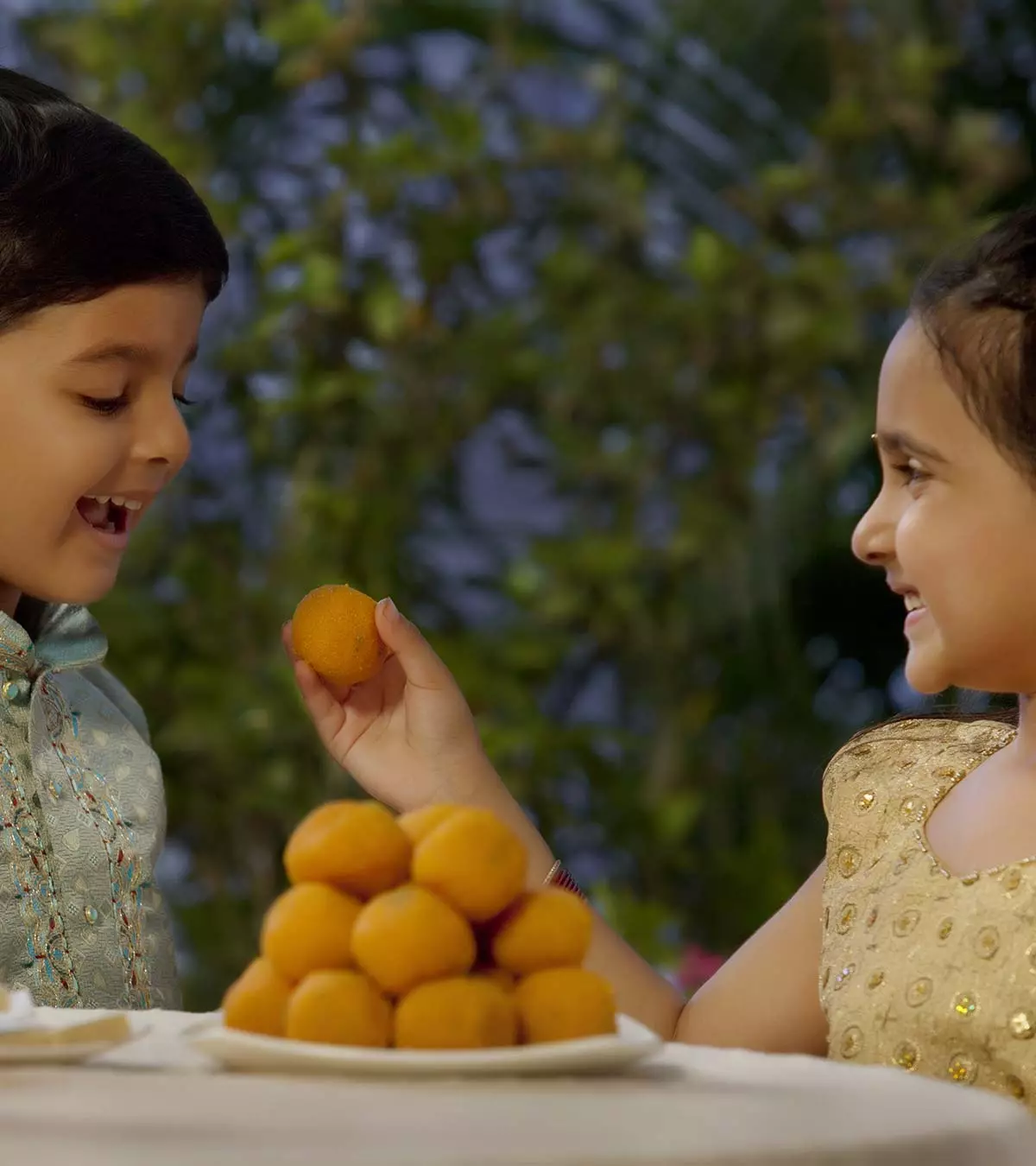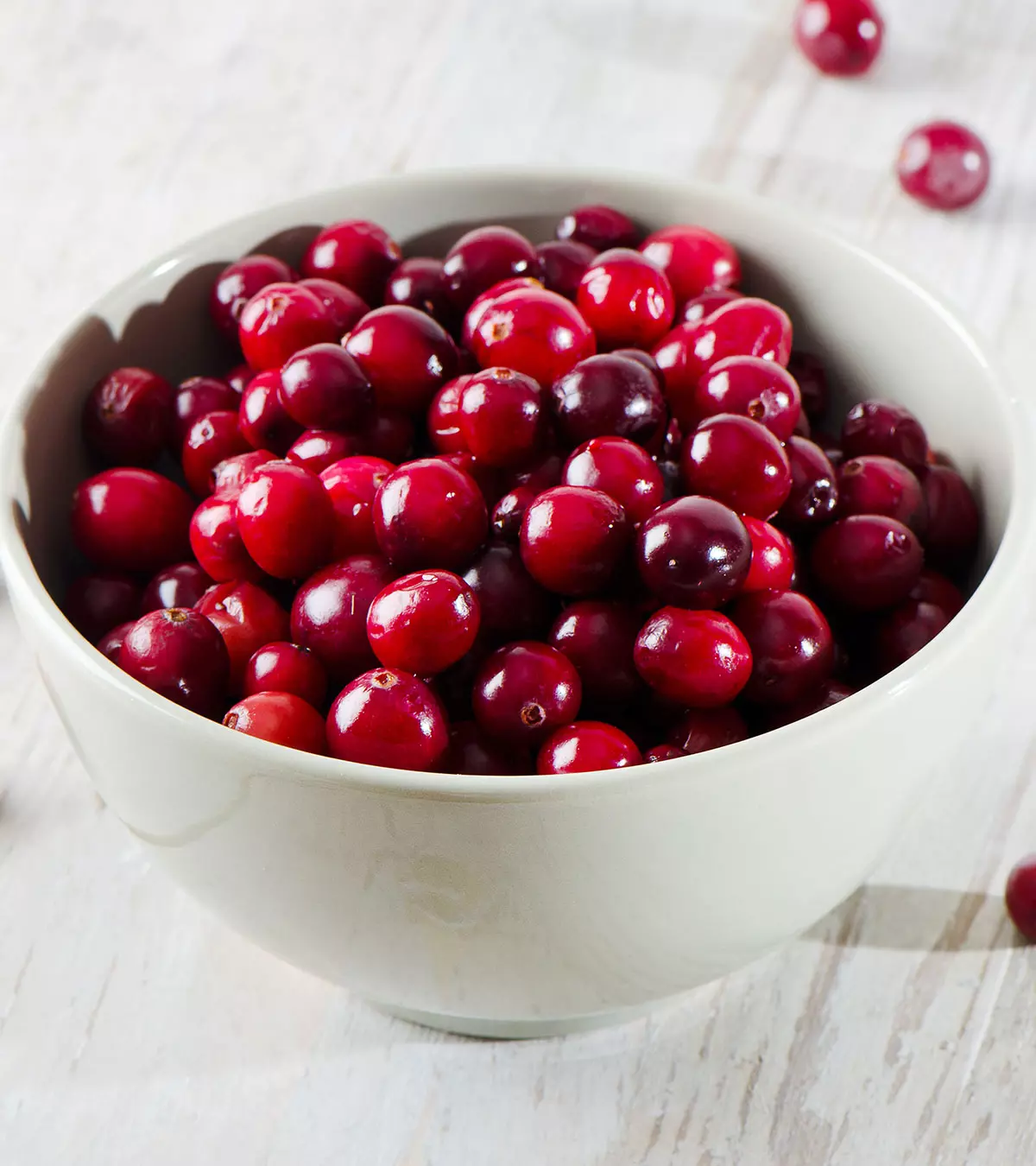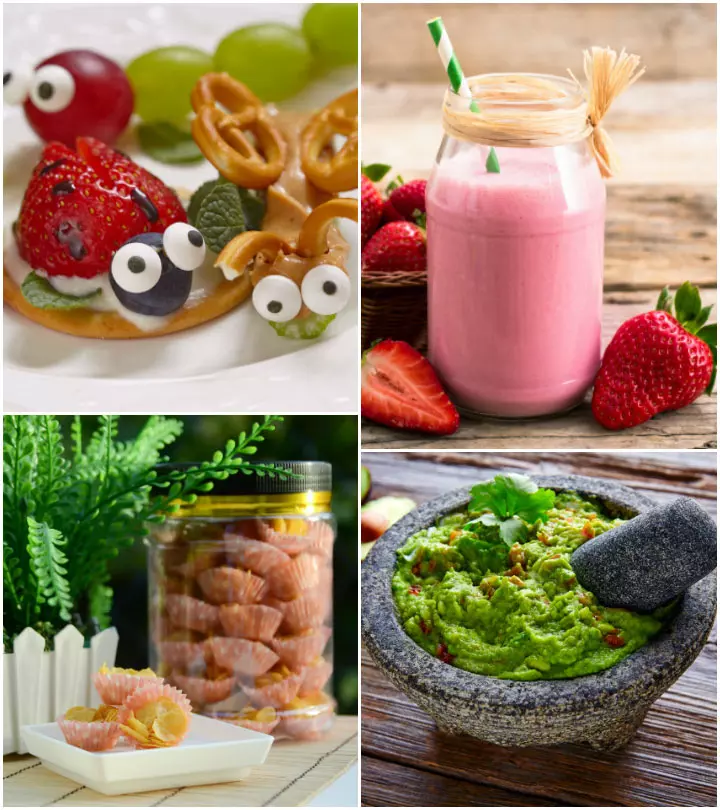
Image: Shutterstock
Many parents would consider an alternative for refined sugars for their child as it lacks nutrients and is high in calorific value. Maple syrup for babies has been increasingly used as an alternative, natural sweetener. It is a derivative of sugar maple trees and has a unique and sweet flavor that many children enjoy (1).
Pure maple syrup is a good source of antioxidants and micronutrients that could benefit a baby’s health. However, due to its high sugar content, you may be doubtful about giving maple syrup to your babies.
This post explains the right age to add maple syrup to your baby’s diet. Also, learn more about the safety, benefits, and possible risks of maple syrup in babies.
Key Pointers
- Maple syrup is usually safe for consumption but may not be suitable for infants.
- It is high in sugar and could increase babies’ calorie count.
- Consult your pediatrician before introducing maple syrup to babies and report any signs of allergies.
- Check the ingredient list while purchasing maple syrup, avoid artificial sweeteners, and choose healthier sugar alternatives.
Is Maple Syrup Safe For Babies?

When compared to honey, maple syrup is safer. Maple syrup directly comes from the sap inside the maple tree, making it free of botulinumiA bacteria that can produce toxins and lead to a serious and potentially fatal disease called botulism spores, which often contaminate honey. Additionally, collected sap is concentrated by heating it until the water in the syrup evaporates (2). This process leaves no possibility for any spores to thrive, preventing the risk of infant botulism.
There is no specific age recommended by experts to start feeding maple syrup to babies. However, natural sugars, such as honey, are recommended to be introduced only after the baby’s first birthday. Therefore, you may use the same rule for maple syrup as well (3). It is because when the sap is collected, it is less sweet. However, during the processing, the syrup turns sweeter and has almost the same calories as white or refined sugar (2). Therefore, if you feed maple syrup to babies, it may cause issues, such as excessive calorie intake.
Thus, maple syrup is one of the foods to avoid for babies below one year. However, if you still wish to use maple syrup for your baby, consult your pediatrician. Once you get a go-ahead nod from them, use maple syrup in moderation as a part of a healthy, well-balanced diet.
Nutritional Composition Of Maple Syrup
The concentrated maple syrup formed after heating the maple sap is filtered, bottled, and graded based on its density, translucency, and flavor (2) (4). The lighter the syrup’s color, the higher its grade. However, a higher grade does not indicate a better nutrition profile.
On average, a tablespoon of pure maple syrup gives the following nutrients (2).
Nutrients | Amount |
Energy | 50 kcal |
Potassium | 35 mg |
Calcium | 21mg |
Sodium | Less than 2mg |
Source
: Food And Agriculture Organization
Maple syrup contains a trace amount of zinc, magnesium, and iron (5). It also contains some phytochemicalsiBioactive components found in plant-based foods that act as antioxidants and have antimicrobial effects and phytohormonesiHormones produced by plants that may impart some health benefits over time (6).
Pure maple syrup is 100 percent concentrated maple sap. It should have no additives, such as preservatives and food coloring (4).
Is Maple Syrup Beneficial In Any Way?
Maple syrup contains trace amounts of minerals, antioxidants, and phytohormones that may offer some health benefits in the long term.
For instance, a recent animal study highlighted the hepatoprotectiveiA medicine or substance’s ability to protect the liver from any damage effects of maple syrup (7).Another study demonstrated that maple syrup contains polyphenolsiNaturally occurring antioxidant compounds found in food items such as fruits, vegetables, coffee, tea, and wine , such as Ginnalins A-C, which have cancer-protective effects (8). A study noted that maple syrup has antioxidant effects, which can counteract free radical damage and promote overall health (9).

Several animal studies highlight the benefits of maple syrup, but more specific research, especially on humans, is warranted. Also, these benefits don’t outweigh the fact that maple sugar is high in sugar, which is a risk factor for several health problems, such as type-2 diabetes. Therefore, maple syrup can be considered slightly better than refined sugar. But, just like any other sweetener, its intake must be kept within healthy limits.
Potential Health Risks Of Maple Syrup
Maple syrup, when consumed in moderation, is unlikely to cause any health issues. However, if its intake is done in excess, the high amount of sugar in maple syrup can cause energy surplus or excess calorie intake leading to unwanted weight gain.
The extra weight over time can lead to lifestyle-related disorders, such as type-2 diabetes and hypertension. The high sugar content of maple syrup may also lead to dental caries and tooth decay in toddlers (10) (11).
According to the WHO Global Oral Health Status Report 2022, foods with high sugar content have been identified as one of the reasons behind the increase in caries in primary teeth, affecting an estimated 514 million children worldwide.
 Quick fact
Quick fact
Precautions To Take While Using Maple Syrup For Toddlers
Below are some vital safety measures to observe while using maple syrup for toddlers.
1. Consult your pediatrician to know the right time to introduce maple syrup to your baby or toddler. Most healthy babies can consume sweeteners, such as maple syrup, once they are 12 months old.
2. Buy pure, organic maple syrup from a trusted manufacturer and reliable seller to ensure the product is premium quality and is adulteration-free.
3. While purchasing maple syrup, check the ingredient list carefully. Some commercial maple syrup may have added sugar and other ingredients, which indicates that the syrup isn’t pure.
4. Begin feeding one-fourth to half a teaspoon of maple syrup initially. Remember, concentrated maple syrup is quite sweet, so start with minimum amounts. Once the toddler adjusts to its taste and digestibility, gradually increase the quantity to no more than a tablespoon.
5. Wait three to five days between introducing maple syrup and other new food. It will help rule out the allergy or intolerance that maple syrup might cause. Most healthy toddlers can digest maple syrup comfortably. But, if the toddler looks uncomfortable after ingesting maple syrup, discontinue feeding immediately. Reintroduce after some time and note the toddler’s reaction. If the toddler still experiences discomfort, stop feeding maple syrup and consult a pediatrician.
6. Maple syrup allergy is rare yet possible. So, if your toddler is allergic to maple syrup, they are highly likely to exhibit symptoms, such as:
- Itching on the skin and rash development (hives)
- Itching and swelling of the mouth and throat
- Abdominal pain
- Wheezing and coughing
- Nasal congestion
- Difficulty breathing
- Anaphylaxis, a severe allergic reaction requiring immediate medical attention
7. Add maple syrup in small amounts to baby food while cooking, such as porridge and smoothies. You can also use it as a sweet treat to spread on waffles and pancakes. Use maple syrup in several ways, but remember to follow moderation. Also, avoid using maple syrup frequently as feeding it may alter a toddler’s taste preferences.
8. Consult a doctor or traditional medicine expert before using maple syrup as an ingredient in any home remedy.
9. Store pure maple syrup in a tightly sealed container in the refrigerator. Sealed pure maple syrup can stay good for up to one year in the fridge. If stored in plastic containers, use maple syrup within three to six months to prevent quality loss.
10. Store any open maple syrup away from foods with a strong odor as maple syrup can pick their smell. Consume maple syrup stored in an open container within a few days.
 Quick tip
Quick tipHealthy Sugar Alternatives For Babies And Toddlers
Occasionally using maple syrup to sweeten a snack or breakfast is best, especially when you have healthier alternatives.
- Fruits, fresh and dried, turned into puree can act as excellent sweeteners. They give your baby and toddler umpteen nutrients and add flavor to different foods. Babies older than six months can consume fruits as a sweetener in various dishes.
- Jaggery is obtained from concentrated date palm or sugarcane juice and contains trace minerals and bioactive compounds. Jaggery for babies can be included in their diet by adding jaggery powder to foods or making its syrup before adding it to recipes. Babies older than six months can consume jaggery safely.
 Health fact
Health fact
- Honey is a natural sweetener and contains trace minerals and antioxidants that may offer health benefits upon continuous use. However, since honey poses a risk of infant botulism, it shouldn’t be fed to babies younger than 12 months in any form.
- Stevia is a plant-based sweetener with zero calories and is 250 to 300 times sweeter than sucrose (table sugar). Use highly pure stevia leaf extracts over stevia leaf or unrefined stevia extract (12) (13).
All these sweeteners can substitute sugar effectively, yet they must be consumed in moderation. Excess consumption of any food, even when healthy, may raise health concerns.
Frequently Asked Questions
1. Is maple syrup a common choking hazard for babies?
Maple syrup is not likely to cause any choking hazards. However, since it makes food sticky, the risk of choking may increase. To avoid choking in babies, you may add maple syrup to soft foods such as bananas.
2. Is pancake syrup the same as maple syrup?
Pure maple syrup is made from maple tree sap that is boiled to reduce the water content and concentrate the sugar. However, pancake syrup is a processed food made from high-fructose corn syrup. It may also contain preservatives and color (14).
3. Can I mix maple syrup with breast milk or formula for my baby?
Breast milk and baby formulas provide all the essential nutrients for babies and may not need to be combined with anything else. Furthermore, maple syrup is very sweet, and regular consumption may lead to a stronger preference for sweet foods in babies. Therefore, it is advisable to consult with your doctor before adding maple syrup to baby formula or a solid diet.
Maple syrup is a natural sweetener. Maple syrup for babies older than 12 months is recommended in moderate amounts as this contains a lot of sugar. Excessive maple syrup consumption may result in negative consequences such as weight gain and lifestyle diseases. Consult your pediatrician or nutritionist about the appropriate amount of maple syrup to give your child. Make sure you do your homework and choose organic, high-quality maple syrup.
Infographic: Ways To Add Maple Syrup To Baby Food
Maple syrup may be given to babies above one year. It should be used in moderation to prevent the baby from developing an inclination toward sweet foods, which are not healthy in the long run. The infographic below brings some delicious recipes for the occasional use of maple syrup in your baby’s diet. Illustration: Momjunction Design Team
Illustration: Maple Syrup For Babies: Safety Precautions And Alternatives

Image: Stable Diffusion/MomJunction Design Team
References
1. A Sticky Situation: The Science of Making Maple Syrup;Illinois Science Council
2. Chapter 5, Sap And Resin;FAO
3. Foods and drinks to avoid or limit; CDC
4. Maple Syrup;Purdue University
5. Syrup, maple, Canadian,FDC ID: 170276; USDA
6. Yan Zhang et al.;Chemical Compositional, Biological, and Safety Studies of a Novel Maple Syrup Derived Extract for Nutraceutical Applications;NCBI
7. Potential Protective Effects of Maple Syrup in the Liver and on Cholesterol;The University Of Rhode Island
8. AntonioGonzález-Sarrías et al.;Maple polyphenols, ginnalins A–C, induce S- and G2/M-cell cycle arrest in colon and breast cancer cells mediated by decreasing cyclins A and D1 levels;Science Direct
9. Katherine M Phillips et al.;Total antioxidant content of alternatives to refined sugar;NCBI
10. Added sugar in kids’ diets: How much is too much?;AAP
11. Diet Tips to Prevent Dental Problems;AAP
12. Margaret Ashwell;Stevia, Nature’s Zero-Calorie Sustainable Sweetener;NCBI
13. Low-Calorie Sweeteners;Harvard T.H. Chan
14. Is Maple Syrup Good for You? Consumer Reports
15. Is Maple Syrup Better for You Than Sugar? Cleveland Clinic
16. Real Food Encyclopedia | Maple Syrup Food Print
17. Abhai Kumar and Smita Singh; The benefit of Indian jaggery over sugar on human health; Research Gate (2020)
Community Experiences
Join the conversation and become a part of our nurturing community! Share your stories, experiences, and insights to connect with fellow parents.
Read full bio of Dr. Elna Gibson
Read full bio of Swati Patwal
Read full bio of Rohit Garoo
Read full bio of Ghazia Shah








